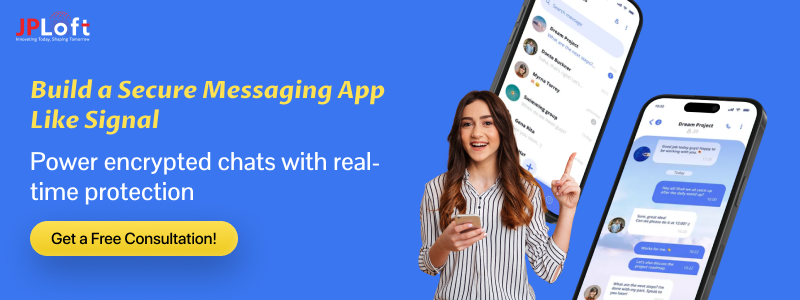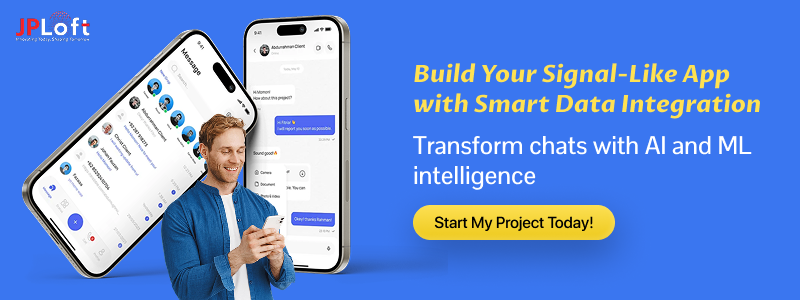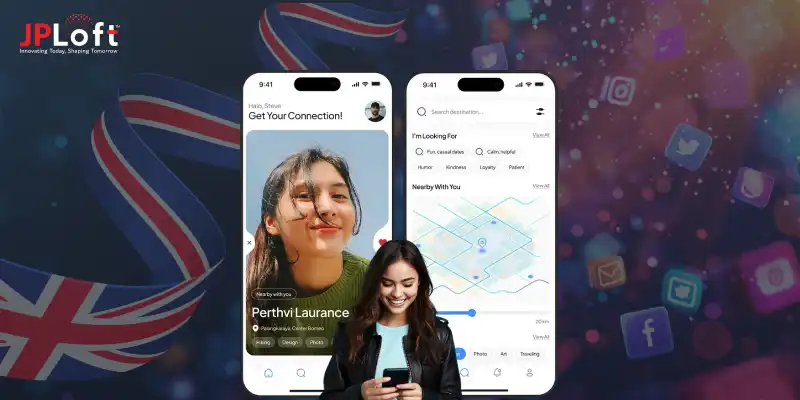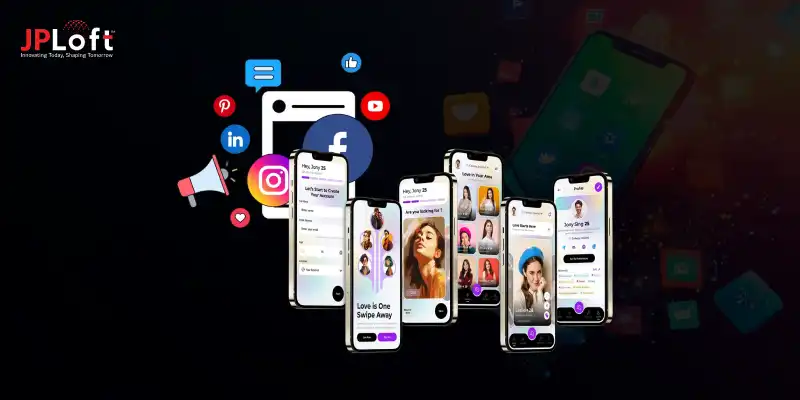Key Takeaways
Signal’s rise highlights the growing global demand for secure, encrypted, and privacy-first communication platforms.
Understanding encryption, scalability, and compliance early can help developers overcome major Signal app development challenges.
To build an app like Signal, focus on robust architecture, seamless UI/UX, AI-driven features, and strong encryption protocols.
Integrating emerging technologies like AI, ML, and blockchain enhances performance, personalization, and long-term app sustainability.
Strategic monetization models, such as subscriptions, enterprise APIs, and premium features, ensure profitability without compromising user trust.
Partnering with JPLoft gives you access to expert developers who specialize in building scalable, secure, and future-ready messaging apps.
In an era where privacy defines user trust, Signal stands as the gold standard for secure communication. With nearly 70 million monthly active users and over 220 million downloads as of early 2025, its rapid growth reflects a global demand for truly private, encrypted messaging platforms.
Renowned for its end-to-end encryption and open-source framework, Signal has set a new benchmark in secure communication, prompting many to wonder what it takes to build something similar.
So, how to create an app like Signal?
To build an app like Signal, developers must integrate robust encryption protocols, design a scalable backend, and ensure a seamless user experience that prioritizes privacy at every stage.
Whether you aim to create an app like Signal Private Messenger or explore modern Signal app development, this guide covers everything, from essential features and security mechanisms to the development cost and tech stack, helping you transform your app vision into reality in 2025.
An Overview of Signal Private Messenger
Launched in 2014 by the non-profit Signal Foundation, Signal has grown into one of the best social media apps for private and secure communication. Unlike ad-driven platforms that monetize user data, Signal emphasizes privacy, transparency, and user control, attracting millions of users worldwide.
Here’s what makes Signal a global leader in secure messaging:
1. Privacy-First Foundation
Signal operates as a non-profit, meaning it has no commercial incentives to sell or share user data. Its mission centers on building tools that keep communication private and user-centric.
2. Proven Popularity and Trust
With over 220 million downloads and around 70 million monthly active users, Signal’s growth reflects the rising global demand for secure, encrypted conversations.
3. Open-Source Architecture
The platform’s open-source framework allows transparency and peer review, enabling developers to learn from its structure and explore how to create a social media app that upholds similar standards of trust and reliability.
4. Advanced Security Features
Features like end-to-end encryption, disappearing messages, and encrypted voice/video calls make Signal a model example of privacy-first innovation.
5. Inspiration for Developers
By studying Signal’s design and functionality, tech innovators can understand how to balance user experience with high-level data security, an essential lesson for any modern messaging app.
As Signal continues to redefine privacy in digital communication, many aspiring developers wonder what powers its unmatched security and seamless functionality. Let’s take a closer look at how an app like Signal actually works.
How Does an App Like Signal Work?
Before you develop an app like Signal, it’s important to understand how it works from a user’s perspective. Signal is designed to deliver seamless, private, and reliable communication without compromising user experience.
Here’s how it functions for everyday users:
► Simple and Secure Sign-Up
Users register with just their phone number, no usernames, emails, or extra data. Signal verifies identity through an SMS code and immediately creates an encrypted identity key on the device, ensuring privacy from the start.
► Sending and Receiving Messages
Every message is instantly encrypted on the sender’s device before being transmitted. Once delivered, it’s decrypted only on the recipient’s phone, ensuring end-to-end privacy. Messages are not stored on Signal’s servers, even temporarily.
► Voice and Video Calling
Users can initiate high-quality voice and video calls that are encrypted just like text messages. The call data never passes through a centralized server unprotected, maintaining confidentiality for both parties.
► Group Chats and Media Sharing
Signal allows users to create private groups where only members can read or send messages. Shared photos, videos, and files are encrypted, preventing unauthorized access or leaks.
► Privacy-Centric Features
Signal enhances security through disappearing messages, screen security, and no data tracking. Even typing indicators and read receipts can be turned off, giving users complete control over their privacy.
► User Data Control and Transparency
Unlike most messaging platforms, Signal collects almost no user data. There are no ads, no behavioral tracking, and no metadata storage, making it one of the most privacy-first apps in the world.
Understanding these core mechanisms will guide you when you create a communication app like Signal that balances user experience, privacy, and scalability from day one.
In the next section, we’ll explore why so many startups and developers aim to create an app like Signal, and what makes it such an inspiring business model.
Why Create an App Like Signal?
With data breaches and privacy scandals dominating headlines, building a secure communication platform has never been more relevant. If you aim to create a private messaging app like Signal, focusing on encryption, compliance, and transparency will help you attract users who prioritize privacy.
1. Rising Global Demand for Privacy-Focused Apps
As users grow more aware of digital surveillance, the demand for encrypted communication has skyrocketed. Investing in secure messaging app development allows businesses to tap into a privacy-driven user base that’s steadily expanding across regions.
2. A Profitable, Scalable Business Model
Signal’s growth highlights that privacy and profitability can coexist. When you develop a private messaging app like Signal, you can explore revenue streams like premium privacy tools, API integrations, or enterprise-level solutions, making your platform sustainable and future-proof.
3. Transparency Builds User Trust
Signal’s open-source framework fosters transparency, which directly boosts user loyalty. Adopting a similar Signal app clone development approach helps build trust while ensuring complete control over your app’s data architecture.
4. Future-Ready Technology and Market Positioning
Embracing Signal-like app development positions your business at the intersection of innovation and trust. Entrepreneurs researching how to start a social media business can learn from Signal’s success, focusing on user safety, ethical design, and compliance to stand out in a competitive landscape.
5. Cost-Efficient Development and Maintenance
Signal-like app development is highly cost-efficient for entrepreneurs and investors. Open-source encryption frameworks and flexible architectures reduce upfront costs while maintaining strong security. This balance of affordability and quality makes it an appealing option for startups aiming for long-term sustainability and reliable user engagement.
Features to Include in an App Like Signal
To develop a private messaging app like Signal, you’ll need a solid mix of security, usability, and innovation. Integrating social media app features such as group chats, voice and video calls, and file sharing enhances interactivity while maintaining privacy, ensuring your app is both safe and engaging.
1] End-to-End Encryption
This is the backbone of any secure communication app. Implementing advanced encryption ensures only the sender and receiver can access messages. For effective Signal app development, adopting proven encryption frameworks like the Signal Protocol is a must.
2] Disappearing & Self-Destructing Messages
Time-bound messages add an extra layer of privacy. Once read or expired, they automatically vanish, a key advantage when you develop an app like Signal for privacy-conscious users.
3] Voice & Video Calling
High-quality, encrypted calls make communication seamless. Modern frameworks allow low-latency audio and HD video without compromising security, an essential part of private messenger app development.
4] AI-Powered Spam and Threat Detection
AI and ML can analyze message metadata (without reading content) to identify spam, phishing attempts, or malicious links. Integrating AI in Signal app clone development strengthens app safety while keeping communication uninterrupted.
5] Media Sharing & File Attachments
Users expect multimedia messaging, from photos to PDFs. Optimized compression and encryption ensure security without lag, improving overall Signal app development performance.
6] Smart Replies and Personalization
AI-driven smart replies, predictive text, and adaptive UI make messaging smoother and more intuitive. These intelligent tools personalize interactions and improve efficiency, transforming traditional chatting into a smarter, more dynamic communication experience.
7] Two-Factor Authentication (2FA)
Adding 2FA ensures account protection even if login credentials are compromised, a critical part of building a secure messaging app like Signal strategies.
8] Cloud Sync and Backup Control
Offer encrypted backups stored either locally or on private cloud servers, giving users full control over their data.
9] Cross-Platform Compatibility
For better reach, plan for Signal app clone development that works seamlessly across iOS, Android, and desktop, all while maintaining encryption integrity.
10] Group Chats with Admin Controls
Group messaging, broadcast lists, and role-based permissions allow privacy with scalability.
Feature Overview Table for Building an App like Signal
|
Feature |
Purpose |
Key Benefit |
|
End-to-End Encryption |
Secures communication so only sender and receiver can access data |
Ensures complete privacy and user trust |
|
Disappearing Messages |
Allows messages to auto-delete after viewing or a set time |
Strengthens confidentiality for users |
|
Voice & Video Calls |
Enables encrypted, high-quality audio and video calls |
Enhances user interaction and engagement |
|
AI-Powered Spam & Threat Detection |
Uses AI to identify spam or phishing attempts |
Boosts security and improves user safety |
|
Media & File Sharing |
Supports images, videos, and documents in chats |
Adds versatility and modern app usability |
|
Smart Replies & Personalization |
Offers AI-based message suggestions and UI adaptability |
Speeds up communication and user satisfaction |
|
Two-Factor Authentication (2FA) |
Adds a verification layer during login |
Prevents unauthorized access |
|
Encrypted Cloud Backups |
Allows users to back up data securely |
Provides flexibility while maintaining privacy |
|
Cross-Platform Compatibility |
Works across iOS, Android, and desktop |
Expands user base and accessibility |
|
Group Chats with Admin Controls |
Enables private or public group communication |
Encourages collaboration and scalability |
Steps to Build an App like Signal
Building a secure messaging app like Signal demands a balance between privacy-centric design, strong encryption, and an exceptional user experience.
Below is a step-by-step process that guides your journey from idea to deployment, ensuring every stage aligns with innovation, compliance, and scalability.
Step 1: Define Objective & Audience
Before you build a private messaging app like Signal, it’s essential to define your vision, target audience, and long-term objectives. This ensures your platform meets modern security and usability standards from the very beginning.
Identify Core Purpose: Determine whether your app will focus on personal communication, enterprise security, or niche community messaging. A defined goal shapes your entire development approach.
Understand User Personas: Study your audience’s demographics, privacy expectations, and app behavior. Tailor features like encryption strength and design flow accordingly.
Align Business Vision: Ensure your app’s security objectives align with long-term monetization and branding strategies. This helps investors and entrepreneurs see tangible value.
Step 2: Conduct Market Research & Competitor Analysis
Effective planning starts with understanding the market landscape. Examining your competitors enables you to build a stronger, differentiated product.
Analyze Major Players: Research leading platforms such as Signal, Telegram, and WhatsApp. Identify what users love and where they face pain points.
Study User Expectations: Explore user reviews and privacy discussions to understand expectations around usability, performance, and security.
Leverage AI Insights: Use AI-based data analytics to predict trends and identify gaps in current communication models. This insight guides innovation and helps position your app effectively.
Step 3: Choose the Right Tech Stack
Your technology stack defines your app’s reliability, speed, and security. Choosing the right combination of tools and frameworks ensures optimal scalability and privacy.
Select a Secure Tech Stack: Opt for secure and scalable frameworks such as Node.js, React Native, and Firebase. This social media app tech stack ensures real-time efficiency and compatibility with modern encryption standards.
Build a Robust Tech Stack: When designing your mobile app tech stack, prioritize cross-platform technologies that ensure consistent performance on Android and iOS devices.
Integrate AI and ML: AI and ML can enhance predictive behavior analysis, detect anomalies, and streamline app performance, ensuring proactive problem-solving.
Ensure Future Scalability: Design your infrastructure with future integrations in mind, from voice transcription to AI chatbots, keeping the system flexible for upcoming updates.
Step 4: Design a Privacy-Focused UI/UX
Design plays a key role in building user trust. Your UI/UX should be intuitive, transparent, and visually reflect privacy as a core principle.
Simplicity and Clarity: Keep your app’s interface clean and distraction-free. Simplicity builds confidence and allows users to navigate securely.
Incorporate Privacy-First Elements: Integrate visual cues like lock icons, private chat labels, and secure onboarding screens to reinforce user trust.
Apply AI-Driven Personalization: AI can adapt chat themes, suggest secure contacts, or switch between light and dark modes dynamically, improving comfort and usability.
Design a Privacy-Focused Interface: Understanding how to design a social media app helps align design logic with user psychology, boosting engagement while keeping security at the forefront.
Step 5: Develop Core Features & Backend Security
Once the blueprint is ready, it’s time to build. A Signal-like app requires integrating advanced privacy features backed by strong backend encryption.
Core Communication Features: Include secure text, voice, and video messaging with disappearing message options and multimedia sharing.
Decentralized Data Handling: Instead of relying on central servers, enable decentralized message routing to minimize data retention.
Encryption Implementation: Integrate advanced end-to-end encryption protocols like Signal Protocol to ensure message confidentiality.
AI-Driven Anomaly Detection: Use AI algorithms to identify unusual login attempts, ensuring proactive protection against intrusions.
Step 6: Integrate Encryption & Authentication
Authentication is the backbone of trust in any secure messenger. Implementing multiple layers of encryption strengthens app credibility and user safety.
Multi-Layer Authentication: Use biometric logins, two-factor authentication, and passphrase-based protection for added security.
Advanced Encryption Modules: Adopt cryptographic frameworks that safeguard text, media, and calls. Combine public and private key mechanisms for dynamic encryption.
AI-Based Security Monitoring: Machine learning models can continuously monitor network activity, detecting and preventing unauthorized access.
Seamless User Experience: Integrate security measures smoothly into the UI so users never feel overwhelmed by technical steps.
Step 7: Test, Launch & Iterate
Testing ensures stability, speed, and security under real-world conditions. This step determines how ready your app is for launch.
Conduct Multi-Level Testing: Perform functional, performance, and regression testing to uncover vulnerabilities before release.
Implement Robust Testing Strategies: Follow proven social media app testing workflows to simulate real-time interactions and heavy user traffic.
Utilize Automated QA Tools: AI-driven automation can accelerate testing cycles, improving reliability and scalability.
Gather Beta Feedback: Run limited releases to collect genuine user feedback, making improvements before the final version goes live.
Step 8: Plan Monetization & Maintenance
Once your app is live, consistent maintenance and strategic monetization are essential to sustain growth.
Implement a Structured Maintenance Plan: A proactive social media app maintenance strategy ensures timely updates, quick bug fixes, and strong uptime performance.
Add Subscription Models: Offer paid tiers for additional features such as expanded cloud storage or enterprise security.
Use Predictive Analytics: Monitor usage trends and predict performance bottlenecks using AI-driven insights.
Collect User Feedback Regularly: Keep communication open with users to evolve features and refine the experience continuously.
Pro Tip: Future-Proof Your Architecture
Scalability should never be an afterthought. From the start, design your architecture for cloud deployment, real-time synchronization, and integration with voice assistants or AI chatbots. This ensures your app remains competitive and ready for the next generation of secure communication technologies.
How to Use Emerging Technologies to Stand Out?
With competition in the messaging app space reaching new heights, leveraging emerging technologies is the key to making your Signal-like app truly stand out.
Integrating AI, ML, blockchain, and advanced analytics not only enhances security but also adds a modern edge to user experience, essential if you plan to make a messaging app like Signal that stands out in today’s competitive market.
► AI for Smarter Conversations
Artificial Intelligence is transforming how users interact with chat apps. When you create an AI app, you can personalize chat suggestions, predict responses, and offer real-time translation.
AI-driven moderation tools also detect spam or malicious content, ensuring safer communication. This makes the app more engaging and user-friendly, a crucial differentiator in Signal app development.
► Blockchain for Transparent Security
Blockchain technology can add an extra layer of trust by decentralizing data storage. Each message or transaction can be recorded in a tamper-proof ledger, minimizing risks of leaks or unauthorized access.
Combined with end-to-end encryption app development, blockchain ensures every conversation remains private and verifiable.
► Machine Learning for Predictive User Insights
Machine Learning (ML) algorithms analyze user behavior to predict communication patterns, improve message delivery speed, and identify abnormal activities.
This empowers an AI app development company to offer smarter, adaptive systems that evolve based on usage trends, boosting overall engagement and satisfaction.
► AR/VR for Immersive Experiences
Though still emerging in messaging apps, Augmented and Virtual Reality can transform how users connect.
Imagine interactive chatrooms, avatar-based calls, or virtual meetups, all powered by AR and VR integrations. For a Signal clone app development project, this opens new dimensions for immersive and emotionally engaging communication.
► Staying Ahead of Trends
Keeping up with social media app development trends is essential. From voice-enabled messaging and AI-driven chatbots to integration with wearables and IoT devices, tech advancements will continue redefining user expectations.
Innovating early ensures your app not only competes with Signal but sets its own benchmark for the next generation of private messaging.
Pro Tip: Combine AI and blockchain innovation to deliver a messaging platform that’s not just secure but intelligent, learning, adapting, and safeguarding users in real time.
What’s the Cost to Make an App like Signal?
Estimating the Signal app development cost depends on various factors such as feature complexity, tech stack, development region, and chosen platform.
Let’s break down the main components that influence the total cost of building such a secure messaging platform.
1] Key Cost Factors
|
Component |
Description |
Estimated Cost (USD) |
|
App Design & Prototyping |
UI/UX design, wireframes, and user journey creation. |
$5,000 – $15,000 |
|
Core Feature Development |
Messaging, encryption, voice/video calls, file sharing. |
$20,000 – $60,000 |
|
Backend & Server Setup |
Database, APIs, and security protocols. |
$10,000 – $30,000 |
|
Testing & QA |
Functionality, performance, and usability testing. |
$5,000 – $10,000 |
|
AI & Encryption Integration |
Incorporating ML models, NLP, and secure algorithms. |
$8,000 – $25,000 |
|
Maintenance & Updates |
Regular bug fixes, scaling, and security patches. |
$3,000 – $8,000 per month |
A basic MVP can cost between $40,000 and $70,000, while a full-fledged Signal-like app development project with advanced encryption, cross-platform compatibility, and AI-driven security could reach $100,000–$200,000+.
2] Regional Cost Breakdown
|
Region |
Hourly Development Rate |
Approx. Project Cost (USD) |
|
North America |
$80 – $150/hr |
$100,000 – $200,000 |
|
Europe |
$50 – $100/hr |
$70,000 – $150,000 |
|
Asia (India, Vietnam) |
$25 – $50/hr |
$40,000 – $90,000 |
Outsourcing to regions like Asia can reduce costs while maintaining quality. Partnering with a mobile app development company in the USA offers added benefits like better compliance, secure infrastructure, and expert handling of scalable encryption solutions, ensuring global standards for privacy-focused apps.
3] Additional Considerations
-
AI and ML Integration: Using AI for predictive text, spam detection, and NLP-driven features adds extra development hours but improves long-term value.
-
Cross-Platform Development: Opting for frameworks like React Native reduces time and cost for both iOS and Android.
-
Data Compliance: Ensuring GDPR, CCPA, or HIPAA compliance increases security assurance but adds to overall cost.
If you’re planning a long-term strategy, consider budgeting for post-launch optimization, analytics, and marketing to achieve steady user growth. Understanding social media app development cost helps in planning realistic financial goals and timelines from the outset.
Pro Tip: Partnering with an experienced development team ensures transparency and scalability in every phase, from prototyping to post-launch upgrades.
How to Monetize an App like Signal?
Unlike ad-driven social media platforms, Signal has built its reputation on privacy and transparency, but that doesn’t mean monetization isn’t possible. If you’re planning to develop an app like Signal, finding the right revenue model is crucial to sustain your platform without compromising user trust. Here’s how you can do it.
1. Freemium Model
Offer essential features for free while charging users for premium options such as extra cloud storage, advanced encryption layers, or group management tools. This approach maintains accessibility while generating steady revenue from dedicated users.
2. Subscription Plans
Monthly or annual subscription tiers are among the most effective monetization strategies for private messaging apps. Subscribers can enjoy perks like higher file-sharing limits, AI-powered spam filters, or early access to new features, enhancing loyalty while keeping ads out.
3. Business API and Enterprise Solutions
Provide secure APIs for enterprises that prioritize data privacy. Companies are increasingly seeking encrypted communication systems, and offering a branded Signal-like app development solution can bring recurring B2B revenue.
4. Donations and Crowdfunding
Signal itself operates through user donations, a model that fosters transparency and community trust. Platforms like Patreon or direct in-app donation options can attract users who value ethical technology and are willing to support privacy-first innovation.
5. Partner Integrations and Cloud Services
Integrating optional cloud backup or productivity tools (like encrypted document sharing) can open up strategic partnerships. This model generates passive income without breaching user privacy boundaries.
Pro Tip: Transparency is everything in secure communication. Always make your monetization model clear to users, ensuring they understand where their data and money go.
If you’re wondering how social media apps make money while maintaining trust, the same logic applies here, prioritize user experience first, and monetize through value-added services instead of intrusive ads.
Challenges Faced in Developing a Social Media App like Signal
While building a privacy-focused communication platform can be rewarding, it also presents several technical and strategic hurdles.
Understanding these social media app development challenges early on helps you plan proactively and build a scalable, secure, and sustainable product.
► Implementing Robust Encryption Protocols
End-to-end encryption is the backbone of a secure chat platform. However, developing and maintaining encryption libraries, managing cryptographic keys, and ensuring seamless message delivery without latency can be highly complex. Any flaw here can compromise user trust.
► Balancing Privacy with User Experience
A great user interface shouldn’t come at the cost of privacy. Many apps overload users with security pop-ups or lengthy consent prompts, leading to frustration. The real challenge is designing a UX that feels both secure and frictionless, a fine line even established platforms struggle to maintain.
► Scaling Infrastructure for Millions of Users
A Signal-like app must handle millions of concurrent messages and file transfers securely. Building cloud infrastructure that supports encryption at scale, manages data synchronization, and maintains uptime requires significant investment and architectural foresight.
► Managing App Store and Regulatory Compliance
Privacy-focused apps must comply with international data protection laws such as GDPR, HIPAA, or CCPA. Moreover, regular updates in App Store and Play Store guidelines can delay approvals or force re-engineering. This adds to the ongoing operational complexity.
► Ensuring Monetization Without Compromising Privacy
Finding the right monetization model without jeopardizing privacy is another major hurdle. Many startups fail because they introduce ads or intrusive analytics, which contradict their privacy promise, a common reason why social media apps fail in the long term.
► Continuous Maintenance and Threat Response
Once the app is launched, continuous security monitoring and patching are crucial. Hackers often exploit even minor vulnerabilities, making ongoing maintenance just as important as development itself. Partnering with experienced cybersecurity professionals can prevent large-scale data breaches.
Pro Tip: Conduct regular code audits and ethical hacking tests to stay one step ahead of potential vulnerabilities. A proactive maintenance strategy ensures your Signal app development project remains compliant, secure, and resilient.
Future Trends in Creating an App like Signal (2026 & Beyond)
As data privacy becomes a universal priority, apps like Signal are paving the way for a new era of secure digital communication.
The future will see deeper integration of AI and ML for intelligent threat detection, spam filtering, and adaptive encryption models that evolve in real time. Decentralized networks and blockchain-based identity verification will further strengthen privacy, reducing reliance on centralized data systems.
Additionally, cross-platform interoperability, voice biometrics, and quantum-resistant encryption are set to redefine what it means to create an app like Signal. These advancements will help developers craft messaging platforms that are not only secure but also smart, scalable, and aligned with the growing expectations of privacy-conscious users.
Partner with JPLoft and Build Your App like Signal
Building a secure, scalable, and feature-rich messaging app requires more than just technical skills, it demands expertise in privacy-first architecture and real-time communication systems.
As a leader in Signal like private messaging app development, JPLoft combines innovation with deep expertise in secure architecture, ensuring your app meets the highest standards of encryption and reliability.
JPLoft, a trusted social media app development company, brings both innovation and reliability to the table. Our team of experienced developers specializes in designing and developing Signal-like apps that emphasize end-to-end encryption, intuitive design, and AI-powered features.
From conceptualization to post-launch support, we ensure every stage of your app development journey is seamless and transparent. Partner with JPLoft to transform your idea into a next-generation secure communication platform that earns user trust and stands tall among global competitors.
Conclusion
Creating an app like Signal isn’t just about replicating its features, it’s about understanding the growing need for privacy, transparency, and user control in modern communication.
As AI, blockchain, and advanced encryption continue to evolve, the opportunity to innovate within secure messaging is immense.
Whether you aim to launch a niche privacy app or a full-scale communication platform, success depends on the right blend of technology, trust, and usability.
With the right strategy, tech stack, and development expertise, you can build a secure, future-ready platform that redefines how users connect, proving that privacy and performance can go hand in hand.
FAQs
To develop an app like Signal, you’ll need to define your app’s purpose, choose the right tech stack (such as React Native, Node.js, and Firebase), and implement end-to-end encryption for secure communication. Partnering with experienced developers ensures scalability, performance, and data safety throughout the process.
The cost depends on features, complexity, and region. On average, a basic MVP can range from $40,000 to $70,000, while a full-featured Signal-like app with encryption, AI integration, and cross-platform support can exceed $100,000.
Must-have features include private and group messaging, voice and video calls, file sharing, disappearing messages, and two-factor authentication. You can also add AI-based spam detection, message translation, and biometric login for an advanced experience.
Signal uses end-to-end encryption, meaning messages are readable only by the sender and receiver. It also minimizes data collection by not storing metadata, ensuring complete user confidentiality.
Yes, AI can enhance a secure messaging app by offering intelligent chat suggestions, real-time spam detection, and adaptive user interfaces. AI also helps improve app performance and optimize data handling without compromising privacy.
A minimum viable product (MVP) can take 4–6 months, while a full-featured app with encryption and cross-platform compatibility may take 8–12 months, depending on the team size and project scope.













Share this blog